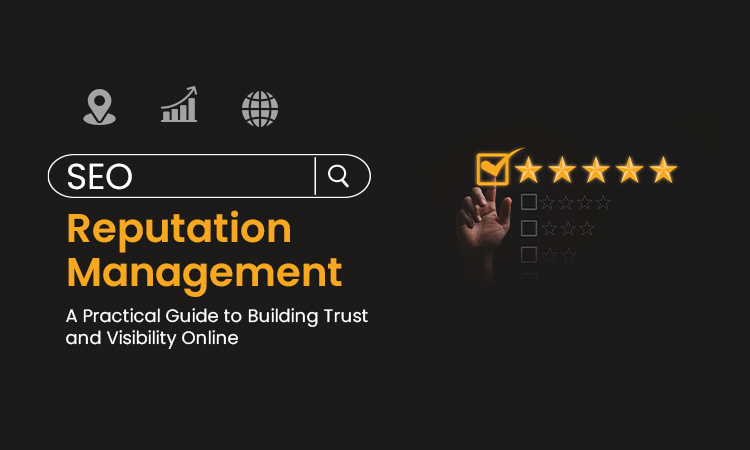Nowadays, businesses struggle to manage their reputation across various online platforms. Search engine optimization (SEO) helps them rank their business higher in relevant search results. On the other hand, online reputation management (ORM) establishes a positive digital image for their business. But together, SEO reputation management works exceptionally well to build customers’ trust back.
Yes, you heard that right! SEO can do a lot more than you ever think. It can help you improve your brand’s online reputation and build a loyal customer base.
A 2024 study by Business Dasher claims that search engines process approximately 2.2 trillion search queries annually. This type of reputation management ensures that the outcome of the search queries shows positive results about your business.
Here in this blog post, we will provide you with a step-by-step guide to online reputation management SEO. Let’s get started!
What Is SEO Reputation Management?
It is a process of managing a business’s online reputation by controlling the search results about it. It requires businesses to perform certain SEO best practices to suppress negative content and promote positive content online about themselves.
It’s like optimizing your business for search engines, but with a different goal – to create a favorable brand image online. In this activity, A business needs to push down the negative search results about it on the search engine results page (SERP).
It needs to implement effective SEO strategies to improve its online reputation by promoting positive brand mentions, reviews, and authoritative web properties. When SEO practices make your website rank higher on the SERP for specific keywords, it naturally improves the business’s online image.
How Does SEO Work for Reputation Management?
In recent years, SEO has become an extraordinary way to manage a brand’s online reputation. With SEO best practices, you can control the results SERP shows about your brand.
We all know that SEO helps a business rank higher in the online search results pages. Right?
When your business appears in the top position in the SERP for relevant keywords that people mostly use to search for your business online, it will reflect a positive online image and authority.
SEO reputation management shapes how your business looks in search engine results. It ensures that search engines show only positive search results when your potential clients search for your personal brand online.
Sounds like a challenge? Let’s understand this more clearly.
- You need to implement SEO strategies to manage information about your business, available online, and specifically, that is mostly accessible to internet users.
- It protects your brand image from several negative online situations.
- It requires you to monitor the negative mentions, track conversations, and proactively manage negative reviews by earning a positive image in the SERP.
- And it ensures that only positive content about your brand ranks online and achieves the most visibility.
- It eventually builds a positive digital reputation for your business.
Today’s businesses understand the importance of a good online reputation and exceptional search engine visibility.
So here is the solution for them – search engine regulation management, where they can combine both SEO and online reputation management strategies to protect their online rankings and brand image.
5 Best Ways to Perform Reputation Management SEO for Your Business
Reputation management SEO helps a business achieve a higher search engine ranking, which increases brand awareness as well. Many may think that SEO and online reputation management are two completely different digital marketing strategies.
While this is true, you can achieve exceptional benefits if you combine these two. Here, we will talk about the five best ways to perform online reputation management SEO to build and manage your business’s online image.
- Brand Presence & Optimization
Does your business have an attractive online presence?
If not, it’s time to prioritize your brand presence with the application of effective search engine optimization techniques. You need to ensure the following things to build a strong reputation online.
- Your business appears on the first page of SERP for relevant keywords.
- Your brand appears among the first five search results in SERP.
- Your website and its content are highly accessible to internet users.
- The search results show positive and accurate content about your business.
Don’t know how you can ensure these factors? The following three techniques can help you improve your brand’s online presence through major optimization practices.
- Conduct Detailed Keyword Research
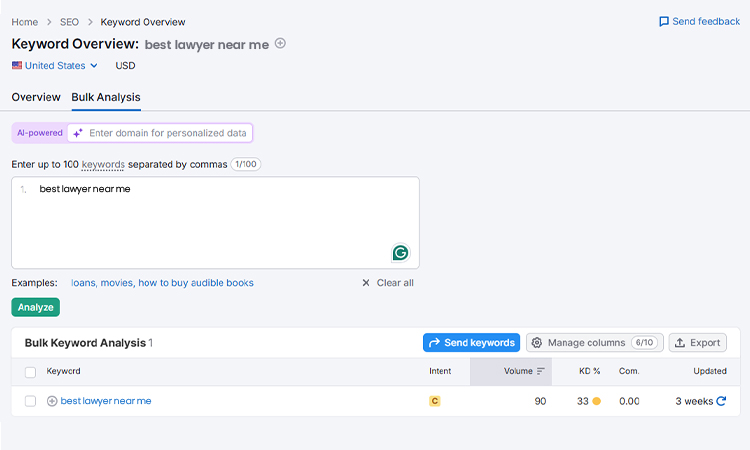
It’s the primary task of search engine optimization. You need to find relevant keywords that most of your potential customers use to search for your business. But for reputation management, you need to find keywords related to your –
- Brand name
- Online reviews
Reason: Most people who are interested in your business, services, and products are more likely to use these keywords to look for significant information about your brand and decide whether it’s a great choice for them.
You can use tools like Google Keyword Planner and SEMrush to get updates on keyword positions and their previous data on the SERP. For instance, you can search for an online review related keyword and monitor whether your review page has ranked higher than other pages in the SERP.
Types of keywords for online reputation management with examples
Did you know that 91.8% of all search queries are long-tail keywords?
No matter what types of keywords you choose to target through your content, you must prioritize long-tail keywords with higher search volume and lower ranking difficulties.
Explore which types of keywords you can use for SEO reputation management.
- Branded Keyword: Your business name, product, and service names
Examples: For a restaurant, you can use the name of your restaurant, such as ‘XYZ Cafe and Restaurant’, ‘XYZ Cafe and Restaurant food options’, and ‘XYZ Cafe and Restaurant weekend brunch specials’.
- Informational Keywords: Phrases that potential patients use to look for information about a business
Example: For a celebrity, you can use keywords like ‘(celebrity name) latest news’, ‘(celebrity name) next movie/album release’, or ‘(celebrity name) workout routine’.
- Negative Keywords: Phrases that customers may use if they have a negative experience or dissatisfaction with your brand.
Example: For a dentist, you can use keywords like ‘XYZ Dental Clinic complaints’, ‘XYZ Dental Clinic terrible service’, or ‘XYZ Dental Clinic bad patient care’.
- Industry Keywords: Terms related to a business’s specific industry.
Example: You can use keywords like ‘best lawyer near me’, ‘top law firm’, ‘bankruptcy lawyer’, or ‘criminal defense attorney’.
- Optimize Your Social Media Profiles
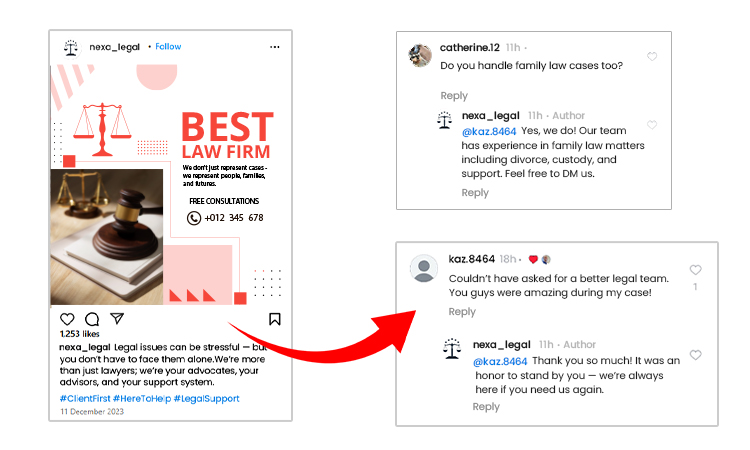
Never ignore your business’s social media presence. It’s an integral part of online reputation management. You can track customer sentiment towards your business and personalize your ORM strategies to ensure success.
Effective optimization of your social media profiles can help you –
- Detect negative sentiment before it transforms into a crisis.
- Engage consumers in meaningful conversations.
- Monitor how social media users perceive your business.
A well-optimized social media account can be an SEO asset for your business. It will help you rank your business for brand queries.
A Point to Remember: You need to ensure that your social media profile ranks higher on SERP, but not above your website.
This way, you can dominate the search results and offer more options to interact with your brand instead of reading a third-party review. Let’s explore how you can optimize your business’s social media accounts.
- Profile picture – You must use a high-quality and consistent profile picture for your business across all social media platforms. It can be your logo or a professional headshot to establish a strong authority for your business.
- Username – The username must be consistent and recognizable across all platforms. It will help you improve your business’s reputation online.
- Bio – You can create a concise and informative bio with target keywords – a good bio is the key to a good social media reputation. It must convey your business’s unique value proposition and what products or services you offer. You need to add the link to your business website or landing page in your bio.
- Other Visuals – It’s important to ensure your cover photo, background images, and other visuals perfectly align with your brand aesthetic.
- Keywords – We suggest you incorporate your target keywords in the profile bio, captions, and even image alt texts. It will help you rank your social media profile higher on SERP.
- Hashtags – Relevant and trending hashtags can improve the discoverability of your social media content.
- Testimonials – You can share positive customer testimonials and success stories of your business through your social media profiles.
- Manage Your Business Listings
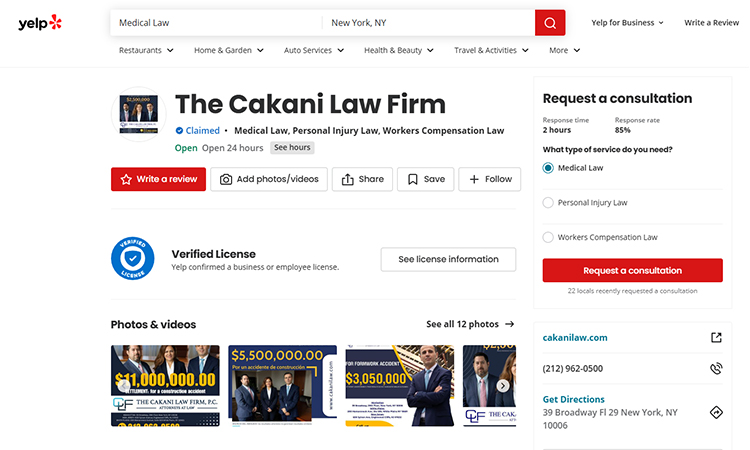
Another SEO reputation management technique is to effectively manage your business listings. Firstly, businesses need to claim and verify their profiles on major business listing platforms like Google Business Profile, Yelp, and social media sites.
- Google Business Profile (GBP) – It’s a must-implemented strategy for local businesses. They must verify their listing to influence how their business appears on Google Search and Maps. The name, address, and phone number, the NAP details of a business, must be accurate and consistent across all platforms.
- Review Sites – Businesses need to claim their profiles on third-party sites like Yelp, TripAdvisor, and other relevant review platforms with all the necessary details.
- Social Media – Create profiles on popular social media platforms like Facebook, Instagram, and Twitter, especially those that are used by your target audience.
How to Ensure Accuracy and Consistency?
You must verify that your NAP details are accurate and consistent, along with your website URL you’ve added in the review sites.
What if you add incorrect or different NAP details across different online platforms? Inconsistencies in NAP details can confuse your customers, leading to customer trust issues and a negative impact on your search rankings.
Apart from the NAP details, you need to incorporate the following information into your business listing.
- Business hours
- Payment options
- Product or services offered
Online reputation management SEO requires you to actively track and respond to your customer reviews. Business listing platforms allow your customers to leave their reviews about your business. You can seek online review management services from a reputable agency with an expert team.
- Content & Media
Your business’s online image highly depends on the type of content you share online. It shows your credibility and the market authority your business holds. Here we have discussed how you can use the right type of content and media to improve your brand’s reputation online.
- Create New Content Around Negative Keywords
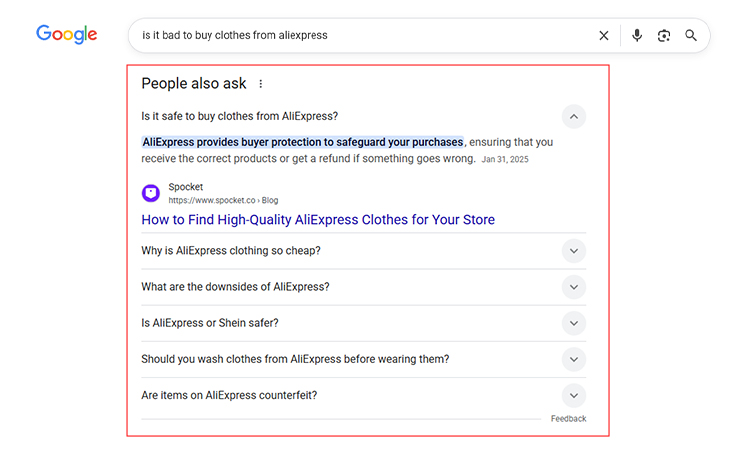
Have you ever noticed the section called ‘People Also Asked’ in the search results page when you search for a specific topic on Google?
These are your consumer queries that offer a goldmine of information about your business or keywords related to it. The entire process requires you to follow a strategic approach.
A Must-Know Information for You: The ‘People Also Asked’ section can help you with the detailed reputation analysis. It helps you identify the most common search queries your consumers can have regarding your business. Through this, you can address those queries and customer concerns through your content and improve your brand image.
And here comes the most interesting part!
These search queries also help you make a list of questions about your brand that your consumers may never have asked. Through this, you can get the list of negative keywords around which you need to create new content.
For example, you own a small business in your locality. As a part of online reputation management strategies for small businesses, you can use ‘people also ask’ queries like ‘is it bad to buy from XYZ store?’ While it’s not likely for your potential customers to have such queries, you must create content addressing such queries to rank your website for featured snippets.
Some examples of common ‘People also asked’ queries are –
- Is the XYZ store a scam?
- Does the XYZ store sell bad products?
- Should I buy from the XYZ store?
- Is the XYZ store legit?
If you don’t prioritize addressing these queries through your content, your potential customers may avoid your business after such a ‘People also asked’ query they never even thought to search for.
- Use High-Quality Visual Elements
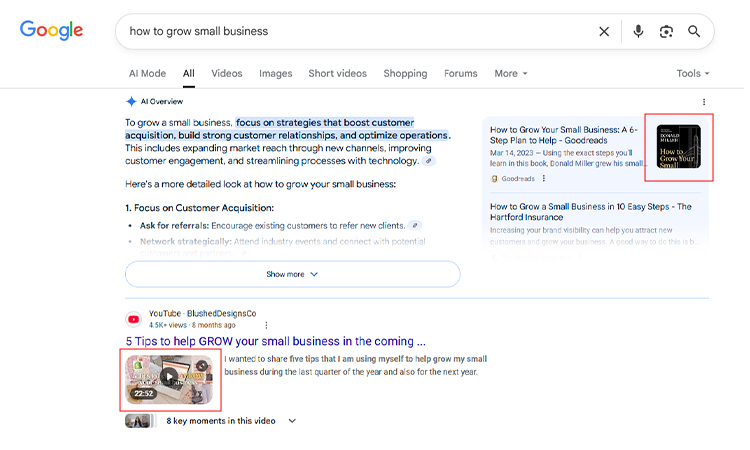
SEO reputation management will be incomplete without the right utilization of visual elements. However, there’s no way to force any search engine to show images or videos in SERP.
But if it does, your responsibility is to create more engaging visual content and optimize it to make it constantly appear. High-quality visual elements can increase brand awareness. If you optimize the alt texts of the images you’ve incorporated in your website and social media, it will rank your images higher on SERP.
When is it essential? If your image in Google search results is negative, it’s a great choice to use attractive imagery and optimize it for SEO. Then it can only boost your online reputation management SEO efforts. You can easily dominate the relevant image searches to push down the negative results.
- Invest in PR

Is your website content aligned with EEAT?
Now you must be thinking what EEAT is. It stands for expertise, experience, authoritativeness, and trustworthiness, which is a guideline of Google to check the quality of content.
Your web content must reflect these four factors to establish a strong online reputation for your business. An easy method to do it? You can invest in digital PR to hit these factors and trust signals that lead to a positive online reputation.
How Will Digital PR Help You?
Digital PR campaigns will show your business in a positive light online in these ways.
- Raising money for a charity
- Contributing to an article as an expert
- Launching a new product through a press release
- Getting your business featured on a reputable website
All these techniques will send signals to Google that you own a business that has a good reputation. So that your prospective customers will be hit with a flood of positive search results about your business whenever they Google your company name.
- Trust-Building Activities
If you want to manage your business’s reputation, you need to build your customers’ trust. Without a loyal customer base, you cannot manage your reputation and protect your online rankings. Here are some trust-building activities you need to consider to ensure the success of your online reputation management SEO.
- Manage Your Online Reviews
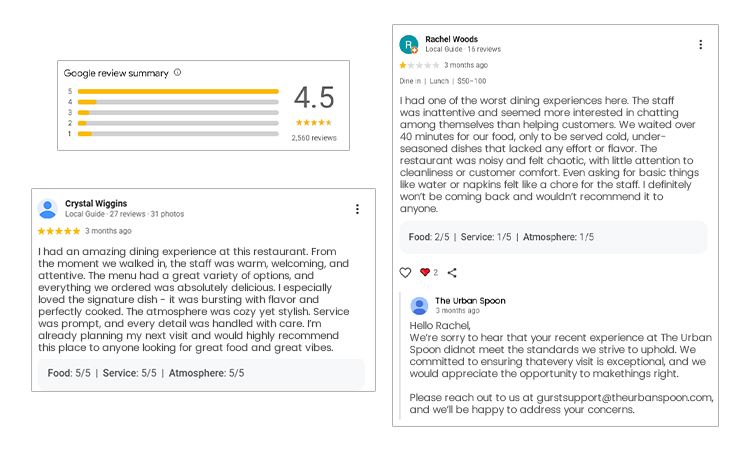
What are your existing customers saying about your brand?
This is the major question your potential customers can have when they want to consider any product or service from your business. Thus, third-party online reviews play a major role even if you put a lot of content about your business out there on the web.
According to a study by Global News Wire, 95% of consumers are more likely to read reviews before they purchase from a business. Good reviews do positively influence a consumer’s purchase decisions.
Here are some online review management strategies for your business.
- Encourage reviews – It solely depends on the type of business you run. You can encourage your satisfied customers to leave their reviews on Google Business Profile and other review sites like Yelp. Sending a review request along with a link to your review site through email is one of the best ideas to do it.
- Respond to negative reviews – Reach out to the reviewer who has left a negative long-form review that ranks in SERP. Clear communication can help the reviewer form a different opinion about your business. Try to fix their problem, apologize for their negative experience, and avoid making excuses.
- Regularly check brand mentions – You can use tools like Google Alerts and Semrush’s brand monitoring to track online mentions of your business.
- Monitor review sites – You must pay attention to reviews on Google, Yelp, Facebook, and other review platforms.
- Track social media – Many customers may leave reviews on your business’s social media platforms, like Facebook. You need to keep track of it as well.
- Respond to every review – You must acknowledge both positive and negative reviews promptly and professionally.
- Promote positive reviews – Did you know that a website can boost its conversion rates by 270% if it showcases reviews? You can showcase your positive reviews through your website and social media business profiles to reinforce positive brand perception.
- Fight review spam – It’s common for businesses to encounter online review spam. It’s crucial to fight spam reviews before they adversely impact your business. You need to report those fake reviews and provide evidence of spam. Additionally, you need to escalate this issue through the review platform’s support channels.
- Build Authoritative Backlinks

Building qualified backlinks is a crucial part of SEO reputation management. This has a very clear theory; let’s understand why it’s crucial.
- When other authoritative websites promote your business through your website link, it sends a signal to the search engines that your business has a good reputation and offers credible services.
- When your potential customers see that reputable businesses promote your brand through their website, it reflects a positive reputation for your brand.
You can earn backlinking opportunities from websites in your niche to convey relevancy. We suggest you reach out to website owners and request that they feature your brand on their website. Qualified link building allows you to target the audiences of other reputable websites, resulting in referral website traffic and increased sales.
- Technical & Local SEO
These two SEO optimization techniques are extremely crucial to improve a business’s online reputation. Even if your goal is to make your brand more visible online, technical and local SEO strategies can be extremely fruitful for your business.
Perform Website Technical Optimization
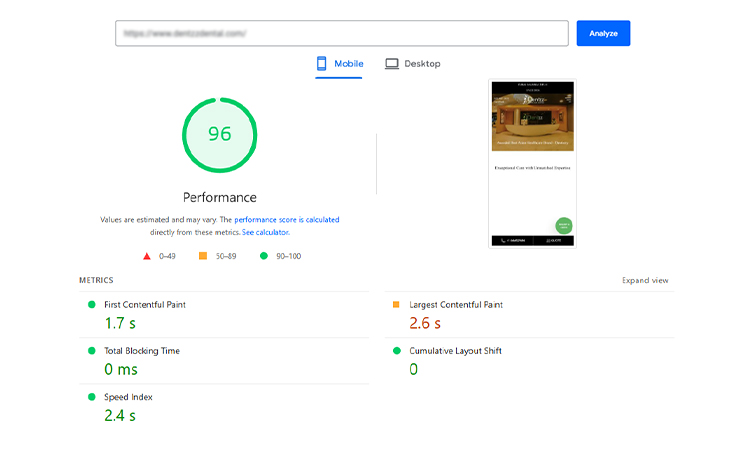
The better your visitors will have a website navigation experience, the better reputation your business will have online. Let’s have a look at how you can perform technical optimization practices.
- Mobile-friendliness
You must ensure your website is responsive and easily accessible by users across all devices and screen sizes. A large number of people use mobiles to access a website. If you don’t target them, you may lose a significant amount of your potential customers. Furthermore, search engines prefer mobile-responsive websites.
- Crawlability
Businesses must incorporate a sitemap and use robots.txt to their important pages of their site to guide search engine crawlers to control which parts of their site are indexed. Additionally, you need to use descriptive and user-friendly URLs to reflect the page’s content.
- Broken Link Fixing
Have broken links in your website? Your potential customers may not prefer to visit your website again. You must ensure that all links and images on your official site are working seamlessly. It’s crucial to prevent your visitors from having any broken link user experiences to avoid potential SEO penalties and a bad online reputation.
- Schema Markup
Always use structured data to provide search engines with context about your website content. You must help the search engines understand the structure of your website content, so that they can rank your website higher in their search results. Schema markup significantly increases the chance of your website getting featured as rich snippets.
Optimize for Local SEO

Struggling to attract your local customers?
Local SEO can help you build a strong presence in the local healthcare market. It’s crucial to have a loyal local customer base, no matter how valuable your products and services are. Let’s find out how you can optimize your website and the online presence of your business.
- Google Business Profile (GBP) Claiming
As a business owner, you must claim your GBP profile with all the NAP details. The name, address, and phone number of your business must be accurately incorporated in your GBP profile.
Additionally, your business hours, website link, answers to FAQs, and pictures of your office are some crucial details you can add to your GBP profile. A well-optimized Google Business Profile listing with essential information is crucial to convey a good reputation for your business.
- Local Directories
Firstly, you need to identify popular online directories. You must find those directories, industry-specific sites, and local listings where you can list your business.
- Google Maps
As a business owner, you must list your office in Google Maps. According to a Backlinko study, 42% of searchers click on results inside the Google Maps Pack. Nowadays, most people prefer to search for a business on Google Maps to locate the store or office. Thus, you need to list your business on Google Maps so that your local customers can easily locate and visit it.
Your business’s Google Map listing helps your potential customers read honest feedback from others. A well-maintained Google Map profile, full of positive reviews, sends a strong signal of trust and reliability to your potential customers, even before they visit your website. And what better than achieving your prospects’ trust to build a positive online reputation?
- Local Keyword Optimization
You must incorporate localized keywords into your website to rank it for relevant local searches. Keywords with ‘near me’, ‘nearby area’, ‘in my location’, and ‘in the city’ phrases are some best examples of location-specific keywords.
The right utilization of these keywords can make your business more visible for online local searches. When your local consumers search for a service or product that you offer or any keyword relevant to your business, your website will rank higher for those searches.
- Ongoing Monitoring
Brand mentions play a crucial role in SEO reputation management. How is your brand being mentioned across online platforms? – It’s extremely important.
Not all brand mentions are beneficial for your business. When a positive brand mention can improve your online reputation, negative brand mentions can ruin the public image your business has online.
What can you do to ensure your online mentions are adding value to the business’s reputation? Regular monitoring of brand mentions can help you act accordingly when something is not in your favor. To ensure its success, you can hire a renowned reputation monitoring agency.
- It helps you understand the sentiment of those mentions and determine the brand narrative.
- It helps you monitor the number of people who reach and how they perceive your business online.
- It allows you to find those individuals who frequently mention your business online, which impacts public opinion.
- It requires you to filter the mentions to remove irrelevant mentions and focus on those that matter.
How to Monitor Brand Mentions?
Follow the instructions mentioned below to effectively monitor brand mentions.
- For Google Alerts, you can set up alerts for your brand name and other keywords relevant to your business. This tool will send you email notifications when new mentions appear online regarding your brand.
- For social media, it’s essential to track when your brand gets tagged in conversations. You need to respond only to those mentions, responding to which you can improve engagement and build a solid online image.
- Track backlinks with SEO software to check whether the new backlinking opportunity comes from an authoritative website or an untrustworthy source.
- Social listening tools like Mention and Brandwatch can help businesses find unlinked online mentions. Because not all the people who talk about your brand online are likely to tag you or offer a link.
- You can also check online forums like Reddit or Quora to track your brand mentions there.
6 Major Benefits You Can Achieve by Prioritizing Reputation Management SEO Strategies
Online reputation management SEO is a complex online marketing strategy for businesses. Here we have talked about the 6 major benefits of this strategy.
- Positive Search Results
The process requires you to optimize your content with relevant keywords. It helps you rank your business higher on SERP. But is a higher search result ranking everything that it offers? The answer is NO! You get to see that search engines are showing only positive content and search results whenever anyone searches for your brand online.
- Promotion through All Content Types
From engaging visual content and social media posts to featured snippets, Google posts, and positive reviews, you can promote your brand through all types of content. Additionally, the first result page of search engines contains multiple types of content. When you target all those, it increases the likelihood of your business being featured on the first page of SERP.
- Suppressed Negative Search Results
The technique requires you to promote positive content and identify the negative content circulating online about your brand. A strategic approach can increase the visibility of your positive content and push down the negative search results. It ensures that your potential customers see only the positive content on the first page of SERP when they search for your business online.
- Customer Trust and Credibility
This process helps you build a strong online reputation through different effective strategies. You can establish your business as trustworthy and reliable online, so that your potential customers can trust your business and seek services or purchase products from it. Positive reviews, higher search engine rankings, and accurate information about your business positively impact your customer trust and credibility.
- New Customer Acquisition
It’s one of the biggest benefits a business can leverage with impactful SEO reputation management strategies. You can drive organic traffic to your website and earn qualified leads who have the chance to convert later. Consumers are more likely to choose a business with a good online reputation. Thus, you can acquire new customers by building a strong digital image.
- Exceptional Brand Image Protection
This is another side of good reputation management SEO. You can protect your business’s online image from potential online reputation threats. The process helps a business manage negative publicity and safeguard its digital image. As it suppresses the negative search results about a business and effectively manages bad reviews, your business can appear higher on SERP with a positive reputation.
Common Challenges You Can Face in SEO Reputation Management
As this business strategy is new and quite complex to implement, there are certain challenges that you can face in managing your brand reputation with effective SEO practices. Let’s have a look at the major challenges you can face.
- Negative reviews – It’s quite common for businesses of any size to receive negative online reviews. While some of your customers can be happy with your services, some may show dissatisfaction with the same.
- Limited online visibility – You can struggle with limited online visibility if you have a specialized target audience. This may make it more difficult for you to rank your business in organic search results.
- Difficulty in review generation – When you send review requests to your existing customers, it may be possible that some of them don’t respond.
- Competitor attacks – Your business competitors may engage in negative tactics and spread misinformation about your brand.
- Search engine algorithm changes – Search engines like Google often update their algorithm. This can impact your website’s ranking and visibility.
- Technical issues – Your website may take a long time to load its pages, function poorly on mobile devices, and have broken links. It can negatively impact the user experience of your website and reflect a bad reputation.
- Reputation crisis – As a business owner, you can experience reputational crises like negative online publicity, product or service failures, negative press, or social media trolls.
- Lack of control over public perception – You may have limited control over what your consumers or customers are saying about you online. It can make it difficult for you to monitor online mentions and engage with feedback.
FAQs
Yes, you can! You can hire a renowned online reputation management agency to seek their reputation management SEO services. Most of such agencies have an expert team of skilled ORM professionals who have proven experience and expertise in handling different reputational issues of the brand. Hiring such an agency can help you get professional guidance and ensure the success of your reputation management SEO efforts.
We cannot specify if it’s essential or not. But you can leverage a list of benefits if you combine these online marketing techniques. Most businesses perform SEO best practices to improve their online search result rankings and increase their digital visibility. But when you combine SEO and ORM strategies, you get to build and protect a positive digital image of your business.
This process requires you to claim a Google Business Profile for your business. Additionally, it requires you to list your brand in popular local directories, Google Maps, and review sites. Adding the NAP details with other essential information about your business to your GBP profile can help your local consumers easily locate your business. Furthermore, it can help you create a memorable presence in the local market and attract more local consumers.
Yes, it does. When people get to see that your business constantly or frequently appears at the top of relevant search results, it showcases that your business has a good reputation. But it’s not the only thing that can reflect a good reputation. It portrays the credibility of your business, which shows your business has a genuinely good reputation with its customers.
Conclusion
Many may not be aware of the benefits SEO can offer. If the strategies are combined with online reputation management strategies, SEO can do more than just rank your business higher on the search results page. You need to implement the strategies effectively and handle reputational issues to establish and maintain a positive brand reputation online.
Our complete guide to SEO reputation management, along with the proven strategies, can help you build your customer trust and online visibility. If you still face difficulties in protecting your brand image online, you can seek personalized online reputation protection services to effectively overcome a crisis and safeguard your online image.

